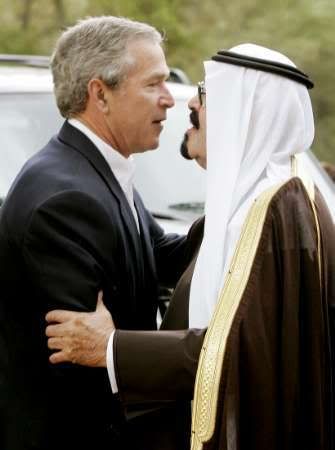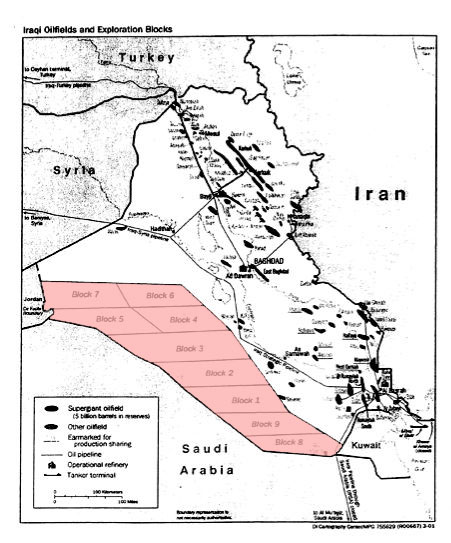Usually, I just post excerpts of articles, but just about every word of this is essential to understand how central oil is to the war in Iraq, what the Bush administration is doing there on behalf of oil companies, and the degree of hatred it will earn us.
The crucial elements are how different the Hydrocarbon Law the Bushies are forcing on Iraq is from how Iraq's neighbors oil industries are set up, and how the Cheney Energy Task Force's recommendation to get Middle Eastern countries to "open up areas of their energy sectors to foreign investment" which was gone with the war in Iraq. Elsewhere this seems to be confirmed by a memo to Condi Rice when she was national security advisor directing her to cooperate with the energy task force in
“the review of operational policies towards rogue states such as Iraq and actions regarding the capture of new and existing oil and gas fields.”Juhasz brought up one angle I hadn't heard yet: that oil companies could get the rights to an oil field then NOT drill for a couple of years. Ironically, the Shah of Iran was offered a similar deal in the 70s. The British wanted exclusive rights to purchase Iranian oil, but not be obligated to do so. So if Britain decided to purchase little to drive up prices, Iran wouldn't be allowed to sell to someone else and would be starved of income. This was a deal even the corrupt Shah couldn't take, so he didn't.
FULL TEXT:
March 13, 2007
Op-Ed Contributor
Whose Oil Is It, Anyway?
By ANTONIA JUHASZ
TODAY more than three-quarters of the world’s oil is owned and controlled by governments. It wasn’t always this way. Until about 35 years ago, the world’s oil was largely in the hands of seven corporations based in the United States and Europe. Those seven have since merged into four: ExxonMobil, Chevron, Shell and BP. They are among the world’s largest and most powerful financial empires. But ever since they lost their exclusive control of the oil to the governments, the companies have been trying to get it back.
Iraq’s oil reserves — thought to be the second largest in the world — have always been high on the corporate wish list. In 1998, Kenneth Derr, then chief executive of Chevron, told a San Francisco audience, “Iraq possesses huge reserves of oil and gas — reserves I’d love Chevron to have access to.”
A new oil law set to go before the Iraqi Parliament this month would, if passed, go a long way toward helping the oil companies achieve their goal. The Iraq hydrocarbon law would take the majority of Iraq’s oil out of the exclusive hands of the Iraqi government and open it to international oil companies for a generation or more.
In March 2001, the National Energy Policy Development Group (better known as Vice President Dick Cheney’s energy task force), which included executives of America’s largest energy companies, recommended that the United States government support initiatives by Middle Eastern countries “to open up areas of their energy sectors to foreign investment.” One invasion and a great deal of political engineering by the Bush administration later, this is exactly what the proposed Iraq oil law would achieve. It does so to the benefit of the companies, but to the great detriment of Iraq’s economy, democracy and sovereignty.
Since the invasion of Iraq, the Bush administration has been aggressive in shepherding the oil law toward passage. It is one of the president’s benchmarks for the government of Prime Minister Nuri Kamal al-Maliki, a fact that Mr. Bush, Secretary of State Condoleezza Rice, Gen. William Casey, Ambassador Zalmay Khalilzad and other administration officials are publicly emphasizing with increasing urgency.
The administration has highlighted the law’s revenue sharing plan, under which the central government would distribute oil revenues throughout the nation on a per capita basis. But the benefits of this excellent proposal are radically undercut by the law’s many other provisions — these allow much (if not most) of Iraq’s oil revenues to flow out of the country and into the pockets of international oil companies.
The law would transform Iraq’s oil industry from a nationalized model closed to American oil companies except for limited (although highly lucrative) marketing contracts, into a commercial industry, all-but-privatized, that is fully open to all international oil companies.
The Iraq National Oil Company would have exclusive control of just 17 of Iraq’s 80 known oil fields, leaving two-thirds of known — and all of its as yet undiscovered — fields open to foreign control.
The foreign companies would not have to invest their earnings in the Iraqi economy, partner with Iraqi companies, hire Iraqi workers or share new technologies. They could even ride out Iraq’s current “instability” by signing contracts now, while the Iraqi government is at its weakest, and then wait at least two years before even setting foot in the country. The vast majority of Iraq’s oil would then be left underground for at least two years rather than being used for the country’s economic development.
The international oil companies could also be offered some of the most corporate-friendly contracts in the world, including what are called production sharing agreements. These agreements are the oil industry’s preferred model, but are roundly rejected by all the top oil producing countries in the Middle East because they grant long-term contracts (20 to 35 years in the case of Iraq’s draft law) and greater control, ownership and profits to the companies than other models. In fact, they are used for only approximately 12 percent of the world’s oil.
Iraq’s neighbors Iran, Kuwait and Saudi Arabia maintain nationalized oil systems and have outlawed foreign control over oil development. They all hire international oil companies as contractors to provide specific services as needed, for a limited duration, and without giving the foreign company any direct interest in the oil produced.
Iraqis may very well choose to use the expertise and experience of international oil companies. They are most likely to do so in a manner that best serves their own needs if they are freed from the tremendous external pressure being exercised by the Bush administration, the oil corporations — and the presence of 140,000 members of the American military.
Iraq’s five trade union federations, representing hundreds of thousands of workers, released a statement opposing the law and rejecting “the handing of control over oil to foreign companies, which would undermine the sovereignty of the state and the dignity of the Iraqi people.” They ask for more time, less pressure and a chance at the democracy they have been promised.
Antonia Juhasz, an analyst with Oil Change International, a watchdog group, is the author of “The Bush Agenda: Invading the World, One Economy at a Time.”
http://www.nytimes.com/2007/03/13/opinion/13juhasz.html
Alternative links:
http://www.iht.com/articles/2007/03/13/opinion/edjuhasz.php














